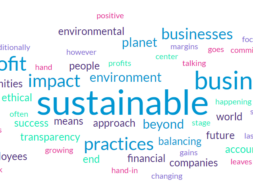
In an era characterized by environmental challenges and increasing concerns over climate change, the concept of a green economy has emerged as a beacon of hope for a sustainable future. A green economy is an economic system that emphasizes sustainable practices and resource management to reduce pollution, conserve natural resources, and preserve ecosystems. This paradigm shift prioritizes the well-being of the environment, ensuring a clean and healthy planet for both present and future generations. In this article, we will explore the key components of a green economy and its profound implications for maintaining a sustainable, thriving world.
- Reducing Pollution
One of the primary goals of a green economy is to reduce pollution across all sectors of society. Traditional industries often release harmful emissions and waste products that contribute to air, water, and soil pollution. However, in a green economy, businesses and individuals adopt cleaner and more sustainable practices, such as using renewable energy sources, implementing energy-efficient technologies, and embracing circular economy principles. These measures significantly decrease the carbon footprint, leading to cleaner air and a healthier environment for everyone.
- Conservation of Natural Resources
A green economy recognizes the finite nature of our planet’s resources and seeks to manage them responsibly. It promotes the efficient use of resources, minimizing waste and maximizing recycling and reuse. Sustainable practices are integrated into various industries, including agriculture, forestry, and manufacturing, ensuring that natural resources are harvested and utilized in a manner that maintains their long-term viability. By protecting and conserving resources, a green economy supports biodiversity and safeguards against the depletion of essential ecosystems.
- Preservation of Ecosystems
Ecosystems play a vital role in sustaining life on Earth, providing various services such as clean water, climate regulation, and pollination of crops. A green economy places significant emphasis on preserving these ecosystems, recognizing that human well-being is intricately linked to the health of the natural world. Efforts are made to protect endangered species, restore degraded habitats, and prevent further destruction of critical ecosystems like forests, wetlands, and marine environments. By prioritizing ecosystem preservation, a green economy fosters a harmonious relationship between humanity and nature.
- Ensuring a Clean and Healthy Environment
At the core of the green economy lies the commitment to maintaining a clean and healthy environment for all living beings. This means not only reducing pollution and conserving resources but also tackling environmental challenges such as deforestation, water scarcity, and loss of biodiversity. Green policies and regulations encourage sustainable land-use planning, responsible consumption patterns, and investment in green infrastructure. As a result, communities enjoy better air quality, cleaner water sources, and an overall healthier environment that enhances public health and quality of life.
- Securing Clean Air, Water, and Food for Future Generations
Perhaps the most crucial aspect of the green economy is its focus on safeguarding resources and the environment for future generations. By adopting sustainable practices today, we can ensure that our descendants have access to clean air to breathe, safe water to drink, and sufficient food to sustain them. The green economy lays the foundation for a more resilient and equitable world, where human progress is no longer at odds with environmental preservation.
The transition to a green economy is not a mere utopian aspiration; rather, it is an imperative for the survival and well-being of humanity. By prioritizing sustainable practices and resource management, a green economy strives to reduce pollution, conserve natural resources, and preserve ecosystems. The benefits of such a transformation are far-reaching, from mitigating climate change and protecting biodiversity to ensuring a clean and healthy environment for both present and future generations. Embracing the principles of the green economy is not just an environmental responsibility; it is an investment in a brighter and more sustainable future for all.

















